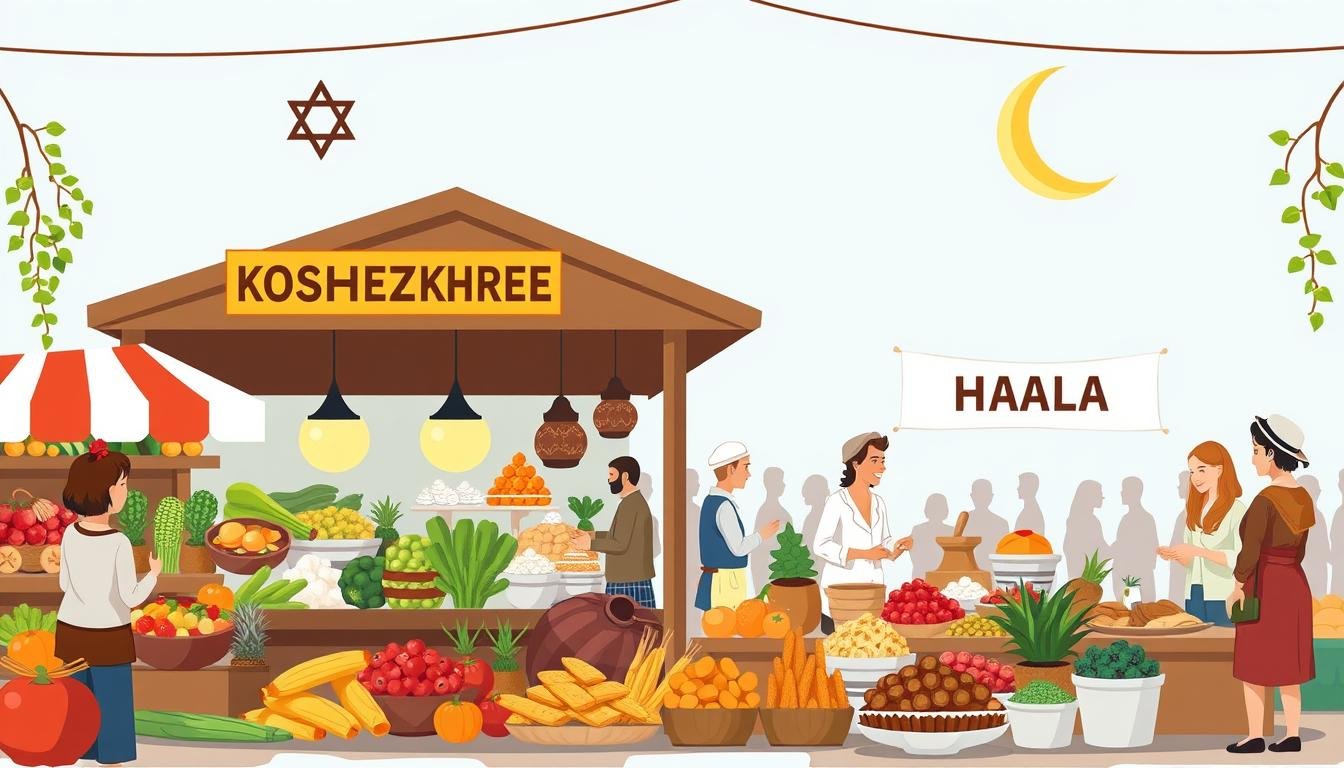Have you ever wondered if what you think you know about Kosher and Halal is wrong? More Muslim people are trying Kosher foods. They wonder if these foods can also follow Muslim dietary rules.
Kosher and Halal have their own rules. There are many Kosher certification groups in the U.S. Each group has its own way of understanding these rules. This makes it hard to know if a food is really Kosher or Halal.
Learning about Kosher and Halal helps us appreciate different cultures. It also helps us make better food choices in a world where people from different faiths live together. Let’s explore the history and practices of Kosher and Halal together. This will help us understand their importance for us today.
Understanding Kosher and Halal Dietary Laws
Kosher laws and Halal laws guide what people eat in their communities. These religious dietary laws come from ancient texts. They tell us what foods are okay to eat.
Kosher laws come from the Hebrew Bible and the Talmud. They say no to eating pigs and some birds. This shows the importance of following these rules.
Halal laws come from the Quran. They tell Muslims what foods are okay. Like kosher, they say no to pigs and carrion.
Both systems have rules about what animals are okay to eat. This makes food choices clear for their followers.
Kosher kitchens need rabbinical checks to follow Jewish laws. Halal kitchens focus on keeping ingredients clean. It’s interesting that Muslims can eat Kosher foods, but Jews can’t eat Halal ones.
The mix of Kosher and Halal rules affects food businesses and traditions. Food makers see the value in these rules, especially in global markets. Knowing these laws helps make food for everyone and shows respect for different cultures.
Defining Kosher: Jewish Dietary Laws
Understanding kosher practices is key to knowing Jewish dietary laws. Kashrut is at the heart of these rules. It tells us what food is okay to eat and how to prepare it.
Kashrut: The System Behind Kosher
Kashrut is the Jewish law for food. It says what food is kosher. “Kosher” means “fit” or “proper” for eating.
This system groups food into three types: meat, dairy, and pareve (neutral). Meat and dairy can’t be together. This rule applies from cooking to eating.
Categories of Kosher Food
Kosher food has its own rules. Meat comes from animals that chew cud and have split hooves. This includes cows and sheep.
Dairy products must also meet these standards. Seafood is okay if it has fins and scales. But shellfish and some sea creatures are not allowed.
Kosher certification is important. It ensures food meets these rules. This helps people follow their dietary laws.
Defining Halal: Islamic Dietary Laws
The halal concept is key for Muslims’ diet. It follows Islamic laws on food choices. Foods must come from allowed animals and be slaughtered the right way, with Allah’s name.
The Concept of Halal in Islam
Islamic laws guide what food is okay to eat. It’s not just about what you eat but how it’s prepared. Halal food helps keep body and soul healthy, as Muslims believe.
Anything forbidden, or haram, must be avoided. This keeps a Muslim’s spirit pure.
Categories of Halal Food
Halal foods follow Islamic rules. Meat from certain animals is halal, and seafood has its own rules. Plant foods are mostly halal, but must not touch haram things.

Kosher Is Halal For Muslim?
Kosher and halal dietary laws are important for many. They ask if these two traditions can mix. While they share some similarities, they also have big differences. These differences help us understand what foods are okay for Jews and Muslims.
Key Differences Between Kosher and Halal
Kosher and halal have different food rules. For example, kosher doesn’t mix meat and dairy. But halal doesn’t have this rule. Also, kosher doesn’t allow pork, but halal does allow some seafood.
These rules show how important it is to follow each tradition’s rules. It’s key to know these rules when choosing food.
The Role of Religious Slaughter
How animals are killed for food is different between kosher and halal. Halal slaughter must be done in the name of Allah. Kosher slaughter, or shechita, doesn’t need to say God’s name.
This shows the unique ways each tradition has. Muslims should be careful with kosher foods. This is because of things like alcohol or gelatin.
The Method of Slaughter: Kosher vs. Halal
It’s important to know how animals are slaughtered in Judaism and Islam. Kosher slaughter, or Shechita, is a special process to reduce animal suffering. Halal slaughter, or Dhabihah, has its own rules to show respect for the animal and say a blessing before it.
Jewish Shechita Explained
Shechita is for certain animals like cows and goats. Some Jews follow Glatt kosher, which checks animals more carefully. A trained butcher, called a shochet, must use a sharp knife for a quick cut.
This way, the animal feels less pain.
Islamic Dhabihah Explained
Dhabihah means the animal must be healthy and not hurt. A Muslim or someone from another religion can do it, saying a prayer facing Mecca. The animal must bleed out fully to follow halal rules.
It also can’t be a predator, showing respect and ethics in halal slaughter. Both Kosher and halal slaughter show great respect for animals and follow strict religious laws.
Common Misconceptions About Kosher and Halal
Many people get kosher and halal mixed up. They think all kosher foods are halal. But, there are big differences between these two ways of eating.
For example, halal doesn’t allow alcohol. Kosher rules about things like gelatin and enzymes can confuse people.

Similarities and Differences Between Kosher and Halal
Kosher and halal both want animals to be treated well when they are killed. But, they come from different religions and have different rules.
Halal is based on Islamic teachings and includes saying Allah’s name when an animal is killed. Kosher, on the other hand, comes from Jewish tradition and focuses on keeping things pure.
This mix of similarities and differences can lead to wrong ideas about these foods. It can confuse people about what they should eat.
Assumptions Made by Muslim Consumers
Some Muslims think all kosher meat is okay for them. But, kosher and halal have different ways of preparing meat.
Knowing these differences is important for making good food choices. For more information on these misconceptions, check out this resource on myths about halal food.
Nutrition and Health Aspects of Kosher and Halal Foods
Halal and Kosher foods focus on health. They follow strict rules to keep people well. These rules make these foods good for you.
Health Benefits Associated with Halal Eating
Halal diets mean food is made without cruelty. They also follow strict food rules. This makes food safer and healthier.
Halal foods are clean and come from good sources. This lowers the risk of bad stuff in food. In the U.S., Halal places are checked often. This makes people trust Halal food more.
Health Considerations in Kosher Foods
Kosher food is guided by Jewish laws. Soaking and salting meat helps kill bad germs. But, cooking food right is still key.
Kosher foods are checked closely for quality. This means they are safer to eat. Following Kosher rules can help you eat better and stay healthy.
Industry Standards: Certifications and Regulations
Meeting specific rules for halal and kosher foods is key. Halal and kosher certifications show if food follows religious laws. Knowing these standards helps those who choose food based on these beliefs.
The Halal Certification Process
The Halal process checks if products follow Islamic rules. It makes sure meat and food are only allowed ingredients. This means the meat is slaughtered correctly, with the name of Allah said during it.
A trusted group gives this certification. This lets people know the food is really halal.
Understanding Kosher Certification
Kosher certification follows Jewish food laws, called Kashrut. It’s based on many rabbinical opinions. This makes it hard to know if food is really kosher.
It’s important to know who to trust for kosher labels. This way, people can be sure they’re eating food that follows their dietary laws.
Cultural Significance of Kosher and Halal Practices
Dietary laws are key in Jewish and Muslim cultures. They connect people to their faith and bring them together. Following kosher and halal rules helps keep these traditions alive.
How Dietary Laws Shape Religious Identity
Kosher and halal laws mark a person’s faith and community. They ban foods like pork and alcohol. This shows the value of purity and moral living.
Ritual slaughter, like Shechita in Judaism and Dhabihah in Islam, shows deep spiritual commitment. It strengthens ties to faith and culture.
Culinary Traditions in Muslim and Jewish Cultures
Dietary laws and food traditions create unique cuisines in both cultures. Events like Ramadan and Pesach show food’s role in faith. They bring people together and encourage respect and appreciation.
For more on this topic, visit Muslim Culture Hub.
FAQ
Can kosher food be considered halal for Muslims?
What are the main differences between kosher and halal dietary laws?
What is shechita, and how does it relate to kosher slaughter?
What does halal mean in the context of Islamic dietary laws?
Are there specific categories that define kosher and halal foods?
Why is it important for consumers to understand the differences in dietary laws?
What health benefits are associated with kosher and halal foods?
How do halal and kosher certifications work?
What cultural significance do kosher and halal practices hold?

Embracing Faith, One Insight at a Time!
The teachings of the Quran have always guided my path. With a deep passion for Islamic knowledge, I strive to blend the wisdom of tradition with the relevance of today, making the timeless messages of Islam accessible and meaningful for everyone.
Muslim Culture Hub is my platform to share historical insights and thought-provoking articles, exploring both well-known and lesser-discussed aspects of Islamic culture and beliefs. My mission is to create an inclusive online space where everyone can learn, strengthen their faith, and connect with the profound message of Islam.
Join the journey!
May peace be upon you.








